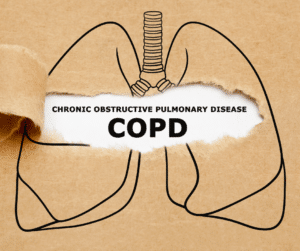Understanding COPD: Early Signs, Risks, and Its Impact on Seniors

Early Signs of COPD
COPD is defined by persistent inflammation of the airways, which results in blocked airflow. Early detection can prevent future damage, although symptoms are typically overlooked or attributed to aging. However, with companion care at home by their side, seniors can better monitor these symptoms and discover a pattern. Key early signs to look for include:
- Persistent Cough: Known as a “smoker’s cough,” this symptom may generate mucus and worsen over months or years.
- Shortness of Breath: Initially felt during physical activity, breathlessness can gradually develop and occur at minimal exercise or during rest.
- Wheezing: A whistling sound when inhaling implies airway constriction and inflammation.
- Chest Tightness: Chest tightness may accompany other symptoms.
- Reduced Immunity: Seniors with COPD are more susceptible to colds, the flu, and other infections due to weaker lung defenses.
- Fatigue: Low oxygen levels and the effort necessary to breathe can leave seniors feeling constantly tired.
These symptoms may appear gradually, leading many to ignore them until serious damage has occurred, which is why it’s essential to pay attention in order to notice what truly may be going on. Additionally, seniors will need to see their doctor and get a lung function test to confirm their diagnosis, and having a record of symptoms helps.
How COPD Impacts Seniors
COPD disproportionately affects seniors due to the natural loss of lung function that occurs with age. Not only that, but conditions such as heart disease, diabetes, and osteoporosis exacerbate the impact COPD has on seniors. For instance, shortness of breath and exhaustion might limit physical activity, resulting in weakness and sedentary behavior. Other ways COPD impacts seniors include the following:
- Increased Hospitalization: COPD sometimes requires emergency care, which can be more difficult for seniors to recover from, as well as exposing them to other illnesses.
- Emotional Health: Seniors with COPD are more likely to experience anxiety and depression, especially if their condition limits their activities.
- Dependency: As the condition progresses, seniors may need oxygen therapy or help with everyday tasks, which reduces their independence and quality of life.
Who is at Risk?
It’s important to understand that while a history of smoking is a major cause of COPD, even for former smokers, that is not the only risk factor. For instance, prolonged contact with irritants such as dust, chemicals, or fumes in the workplace increases vulnerability. Also, exposure to poor air quality, secondhand smoke, and extended exposure to indoor pollutants such as biomass fuel can all contribute to the disease. Genetics also play a part, as a deficit in alpha-1 antitrypsin—a lung-protective protein—increases vulnerability to COPD, even in nonsmokers. Finally, as mentioned, the risk of COPD increases with age due to cumulative exposure to risk factors and deteriorating lung function.
Understanding the early symptoms of COPD and the factors that enhance its likelihood is critical for early treatments, especially for seniors. The good news is that companion care at home can help them watch for signs and encourage the reduction of risk factors, as well as communication with the medical team to ensure seniors are in their best health.
If you or an aging loved one are considering Companion Care at Home in Lexington, NC, contact the caring professionals at TenderHearted Home Care today. Call us at (704) 612-4132
- Seniors and Unreported Falls - May 22, 2025
- Six Areas Your Loved One May Need Help With During the Early Stages of Alzheimer’s Disease - May 8, 2025
- What Harms Senior Mental Health? - April 23, 2025

